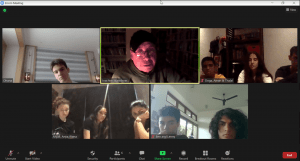Last year, I had the opportunity to participate in an ISTA TaPs (International Schools Theatre Association) workshop, along with the rest of my class. Our guest artist for the 3-day program was Mr. Joachim Matschoss, who is currently based in Melbourne, Australia.
Our first day consisted of learning the art of Bunraku Puppetry, which originates in Japan. We were able to make our own puppets and experiment with different ways of utilizing them to tell stories. I found that there were certain techniques that allowed the movements of the puppets to look more natural, which was an interesting discovery.
On our second day, we explored creating scenes and looked at variations in the styles of two different play-makers, Brecht and Stanislavski. We primarily focused on our use of space, and relation, and I came away with a bit of insightful knowledge- acting is reacting.
On our third day, we looked at movement and sound. We also played around with light. We split into groups to devise our own performances, which we then presented to the rest of the class. We finished off with a reflective discussion and thanked Mr. Matschoss.
Overall, although the event was tiring, it felt particularly rewarding- especially as each day slightly differed from the last, and we were able to acquire new skills and pick up on our mentor’s expertise. As there was a lot of partner work involved, we were able to become more comfortable collaborating to produce something that would be viewed, and got over our “Zoom fright”, so to speak. I think that participating in this ISTA workshop set the tone for the rest of the course, and allowed us to gain more confidence overall.
Learning Outcomes:
LO1: Identify own strengths and develop areas for growth- Students are able to see themselves as individuals with various abilities and skills, of which some are more developed than others.
LO2: Demonstrate that challenges have been undertaken, developing new skills in the process- A new challenge may be an unfamiliar experience or an extension of an existing one. The newly acquired or developed skills may be shown through experiences that the student has not previously undertaken or through increased expertise in an established area.
LO4: Show commitment to and perseverance in CAS experiences- Students demonstrate regular involvement and active engagement in CAS.
LO5: Demonstrate the skills and recognize the benefits of working collaboratively- Students are able to identify, demonstrate and critically discuss the benefits and challenges of collaboration gained through CAS experiences.
